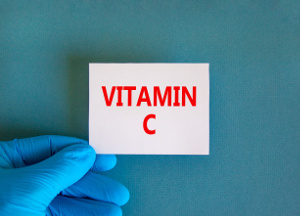Vitamin C inhibits a dangerous inflammatory condition in leukemia
 A type of cancer called chronic myeloid leukemia is characterized by an overproduction of white blood cells that can lead to symptoms like fatigue, infections, and other complications. Another characteristic feature of chronic myeloid leukemia is chronic inflammation that contributes to the disease progression. Vitamin C, however, appears to counteract the inflammation, according to a Brazilian in-vitro study that is published in Nutrients.
A type of cancer called chronic myeloid leukemia is characterized by an overproduction of white blood cells that can lead to symptoms like fatigue, infections, and other complications. Another characteristic feature of chronic myeloid leukemia is chronic inflammation that contributes to the disease progression. Vitamin C, however, appears to counteract the inflammation, according to a Brazilian in-vitro study that is published in Nutrients.
Our bone marrow produces stem cells for white and red blood cells and blood platelets. Chronic myeloid leukemia is when a special chromosome named Philadelphia suddenly mutates, causing white stem cells to divide uncontrollably. Other symptoms may also occur such as a lack of blood platelets, enlargement of the spleen, and lack of red blood cells (anemia).
The classical symptoms are tiredness, infections, nocturnal sweating, and weight loss. Other symptoms like loss of appetite and digestive disorders due to an enlarged spleen may also occur. The disease progresses slowly and is therefore often discovered randomly in connection with a blood test. Left uncontrolled, chronic myeloid leukemia can cause bleeding and blood clots.
Infections like influenza and COVID-19 may also become complicated because the white blood cells and inflammatory defense mechanisms malfunction. The authors of the new study mention that chronic myeloid leukemia is associated with an increased production of different pro-inflammatory cytokines (IL-6 and TNF) that are linked to an increased formation of cancer cells that are quite resilient.
In its advanced stages, the disease progresses to acute myeloid leukemia with bone pain. Here, the average survival is 3-6 months, unless the patient gets a bone marrow transplant.
The underlying reason for why chronic myeloid leukemia develops is rarely known. One type of therapy involves the use of a drug called Imatinib that is a so-called tyrosine kinase inhibitor with a rather good survival rate.
Vitamin C apparently also features similar survival mechanisms, and the authors wanted to take a closer look at them. They studied blood samples with chronic myeloid leukemia cells (K-562) from the Rio de Janeiro Cell Bank. The cells were cultivated in a concentrated glucose culture, which caused them to divide rapidly. The cells were then pre-treated with two different doses of vitamin C (5 micrograms/ml and 10 micrograms/ml). The two cell cultures were then stimulated with the pro-inflammatory toxin LPS (lipopolysaccharide) from Gram-negative bacteria. Afterwards, the scientists measured how vitamin C affected the cells’ release of pro-inflammatory cytokines such as IL-6 and TNF.
Vitamin C affects leukemia by way of different mechanisms
The study showed that vitamin C counteracts the hyperinflammatory stages that were initiated by the LPS toxin in chronic myeloid leukemia cells (K-562), possibly by way of several mechanisms. First of all, the scientists assume that vitamin C blocks the overproduction of extracellular ATP (energy molecules) and the accumulation of the P2X7 receptor that plays a key role in inflammation (via IL-6 and TNF) and different cancer forms.
Secondly, vitamin C regulates autophagy, which is a vital process that involves the breakdown of harmful compounds in cells and cellular homeostasis. But studies have shown that autophagy has a double role in the development of chronic myeloid leukemia. On one hand, autophagy can improve the cells’ survival and resistance towards therapy. On the other hand, excessive autophagy can result in cell death.
In chronic lymphatic leukemia, there is a special biomarker (LC3) for autophagy. In the study, the researchers observed that vitamin C in high doses lowered levels of this marker, and the effect was followed by a down-regulation of the two pro-inflammatory cytokines IL-6 and TNF. Vitamin C also appears to improve Imatinib therapy by supporting the actions of the drug and vice versa.
Vitamin C for prevention and therapy
Although vitamin C deficiency is rarely seen in the general population, cancer patients often have low levels of this particular vitamin. It has been reported that low vitamin C levels may contribute to the development from normal to leukemia cells, whereas high-dosed vitamin C therapy can kill off leukemia cells. Vitamin C supplementation can also improve quality of life in patients suffering from leukemia.
Vitamin C is also important for the immune defense that is designed to destroy abnormal cells. Moreover, vitamin C is an antioxidant that protects cells against oxidative stress and DNA damage caused by free radicals.
It is relatively easy to get the recommended intake of vitamin C from a healthy, balanced diet. Various physical and psychological stress factors, however, can increase the need for the nutrient. The same goes for excessive consumption of sugar. Sugar and vitamin C compete for the same channels that lead into the cells, so people who eat a lot of sugar may have a reduced effect of the vitamin C they ingest and therefore need to consume larger quantities of the vitamin. This also goes for other vulnerable groups.
Reference:
Daniela A. Pires et al. Vitamin C Inhibits Lipopolysaccharide-Induced Hyperinflammatory State of Chronic Myeloid Leukemia Cells through Purinergic Signaling and Autophagy. Nutrients 2024
Sam Rowe and Anitra C. Carr. Global Vitamin C Status and Prevalence of Deficiency: A cause for Concern? Nutrients 6 July 2020
Kronisk myeloid leukæmi - Patienthåndbogen på sundhed.dk
TIP! See also the related articles
Search for more information...
- Created on .








